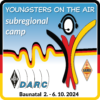From the 11th to the 17th of August 2019 around 80 youngsters from 27 countries met in Bankya, near Sofia, the capital city of Bulgaria to connect and learn from each other. The event was organised by the Bulgarian Federation of Amateur Radio as part of IARU Region 1’s “Youngsters On The Air” program, abbreviated as YOTA. The summer camp is held in a different country every year, over the last years it has been held in Austria, the United Kingdom, South Africa and many more. YOTA is growing quickly, this year’s summer camp demonstrated this especially well. The great majority of participants had never participated in a YOTA summer camp before, they are a new generation of young amateur radio enthusiasts. Another thing showing YOTA’s success is the number of girls at the camp, 40% of the participants were YLs, a percentage not often seen in amateur radio.
During the week youngsters did a variety of workshops such as building VHF and HF antennas, electronic kits, and much more. However the focus of this week’s presentations was on learning from each other: YOTA is shifting more and more towards a “youngsters for youngsters” approach where youngsters teach each other, rather than relying on older generations for input. A number of participating youth teams presented their youth activities. For example, the Finnish team gave an insight into the Nordics On The Air sub-regional camp, they not only showed how successful it was, but gave great tips and a good guide to organising such an event. The main goal of the YOTA summer camp is to give youngsters the ideas, knowledge and experiences they require to go back to their home country at the end of the week and start their own youth activities. The practical workshops are mostly easily reproducible so that youngsters could use them to introduce new young people into the hobby. For example youngsters might do a kit building workshop at a local school or use the antenna built at the camp to do a SOTA activation together with some new youngsters.
Sub-regional camps like those held in Finland, Italy and Germany in the last years are being organised more and more. For example, the next one is already being held in September in the Czech Republic, followed closely by a camp in the Netherlands in December. The idea behind a sub-regional camp is to bring together around 30 youngsters for an extended weekend, for example from Thursday until Sunday. Other than the YOTA summer camp, these camps are also used to bring new youngsters into the hobby. Un-licensed youngsters who know relatively little about amateur radio are invited to these camps to show them how interesting and fun amateur radio is.
The Italian youth team’s presentation showed very well that a sub-regional camp can be organised on quite a limited budget, their camp only cost 25 euros per participant per day. Furthermore they showed how such an event can re-vitalise a local radio club. The radio club supporting the event gained many new members as many of the participants of the camp did their license after the camp and joined the club. Furthermore the existing members of the club became more active as they organised the camp together.
A large number of youth teams now want to organise such an event, and during the coming months there will be many applications to IARU to hold a YOTA sub-regional camp. What the participants learnt at the YOTA summer camp will be an invaluable resource for organising sub-regional camps and youth activities on any scale.





Good idea to allow young people to show us ‘oldies’ the future – well done. 73 Eda ZS5YH